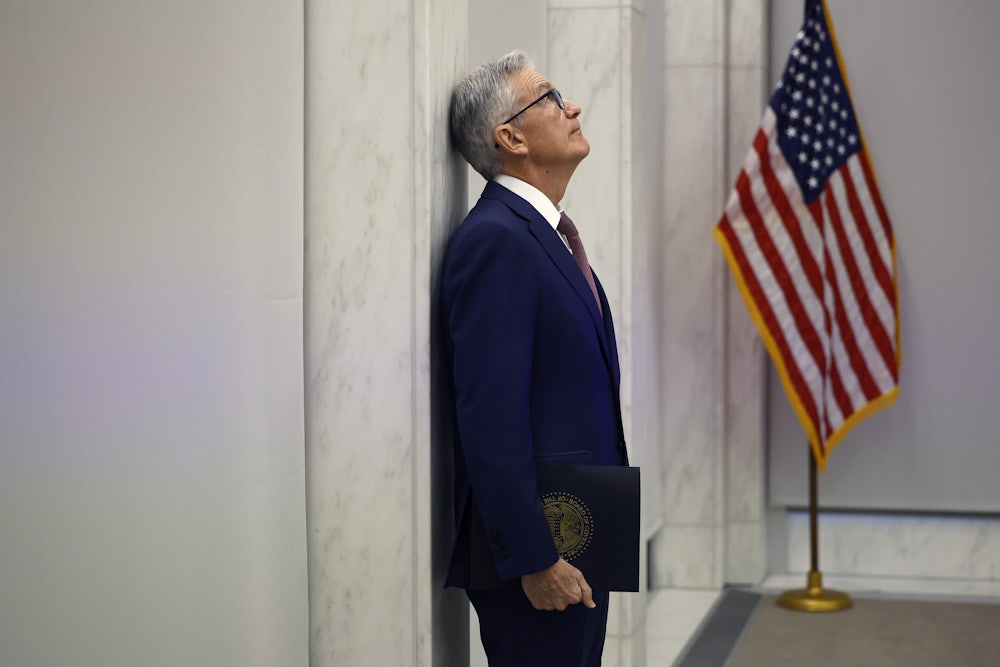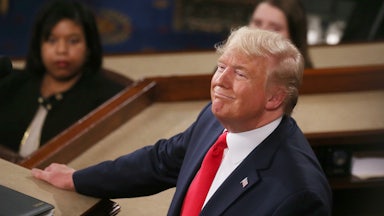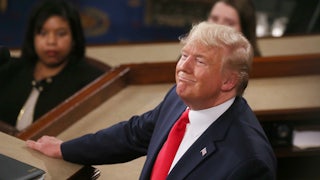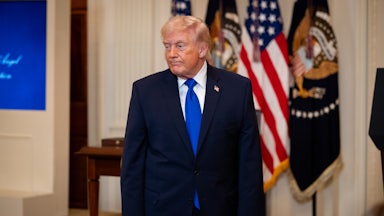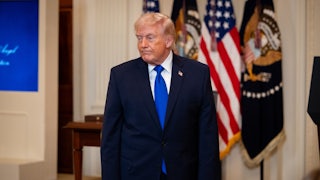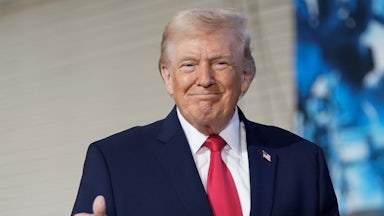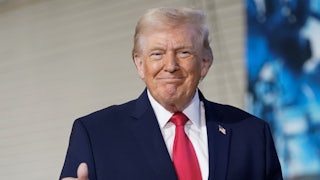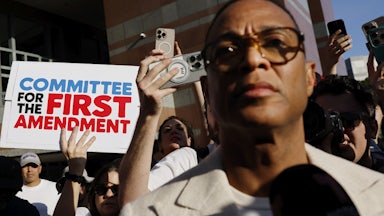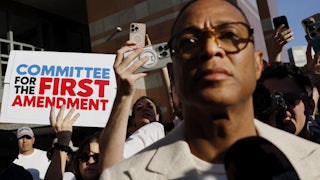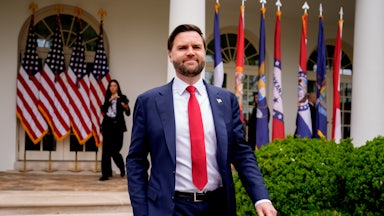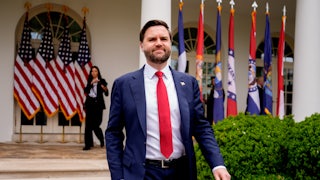As I write, President Donald Trump is doing what he loves best, which is to gather the world’s attention as he threatens to break some rule or other. This time he’s preparing to fire Federal Reserve Chair Jerome Powell, a.k.a. “Mr. Too Late [to lower interest rates], a major loser.” If only because the world can’t quite believe Trump will do this, he will do it—probably in the next day or two, but certainly well before Powell’s term ends in May 2026. More importantly, the Supreme Court will allow it to happen.
I keep seeing the word “unprecedented” in news reports about the possibility of Powell’s firing. It is not unprecedented. Granted, no president has ever fired a Fed chair, but the Fed is an independent agency, and Trump has already fired a baker’s dozen such officials at nominally independent agencies. These include three members at the Privacy and Civil Liberties Oversight Board; two each at the Equal Employment Opportunity Commission and the Federal Trade Commission; and one each at the National Labor Relations Board, the Federal Election Commission, the Office of Special Counsel, the Merit Systems Protection Board, the Federal Labor Relations Authority, and the Consumer Financial Protection Bureau.
These firings have caused no small amount of chaos within the administrative state, which matters more than even liberals fully understand. But the market didn’t tank when these earlier officials were fired, because the market neither knows nor cares what these government agencies do. They are all important bulwarks against corruption in the public and private sectors, which is something the financial markets ought to think about but don’t. However, the financial markets think a lot about the Fed—which is why the stock market and the dollar are both tanking as I write this.
Fed Chair Jay Powell is apparently confident that he can’t legally be fired because the statute that created the Fed said a Fed governor (of whom the chair is one) can be removed only “for cause.” But the statutes that created all those other agencies said more or less the same, giving officials set terms and allowing for them to be renominated, or not, by the president and then confirmed by the Senate. These statutory protections were affirmed 90 years ago, to President Franklin Roosevelt’s great annoyance, in Humphrey’s Executor v. United States.
Nobody wants to believe it, but the Fed is as reliant for its independence as any other independent agency on Humphrey’s Executor. “There is no legal difference,” the FTC’s Rebecca Kelly Slaughter told Bloomberg after her firing, “between Jerome Powell and me. If the president can legally remove me, he can legally remove Jerome Powell.” She’s right.
The reactionary Supreme Court is itching to overturn Humphrey’s Executor. It signaled it will do just that earlier this month when Justice John Roberts stayed an appeals court’s reinstatement of Gwynne Wilcox, a Democratic member of the NLRB, pending review by the high court. Roberts may as well have said, “Why bother putting her back in when we’re just going to kick her out later?”
The move barred the NLRB from operating with a three-person quorum, two of them Democrats. While Wilcox was there, it was a small island of liberal policymaking in a sea of Trump disruption because Trump didn’t get it together to fill two Republican vacancies. A nonfunctioning NLRB isn’t much better for Trump because, as I’ve noted before, without at least one more Republican member, the NLRB can’t overturn Biden-era precedents that tilt the power balance away from management and toward workers. But the Trumpies aren’t sophisticated enough to understand that.
Hopes that the Supreme Court will stop short of letting Trump do to the Fed what it will let him do to every other independent agency rest on footnote 16 to a dissent in the 2023 decision Consumer Financial Protection Bureau v. Community Financial Services Association. That ruling removed the CFPB director’s protection from firing but stopped short of overturning Humphrey’s Executor. The dissent, by Justice Sam Alito and Neil Gorsuch, said the court should have overturned Humphrey’s Executor. Footnote 16 replied to the Biden Justice Department’s argument that overturning Humphrey’s Executor would eliminate the Fed’s independence from the White House. Or rather, the footnote purported to reply without really replying at all.
In footnote 16, Alito and Gorsuch said that the Fed’s “setup should not be seen as a model for other Government agencies” because it “is a unique institution with a unique historical background,” which Alito and Gorsuch then proceeded to relate: the rise and fall of the First and Second Banks of the United States, the financial panics of 1873, 1893, and 1907, and so on. None of this History Channel filler constituted a legal argument for why and how the Fed might be treated differently from other independent agencies, each of which has its own “unique historical background.” Nor did the footnote’s language constitute any sort of pledge from Alito and Gorsuch to exclude the Fed when they got around to overturning Humphrey’s Executor. It was simply included to shush the opposition, however temporarily.
It’s fun to watch those administration officials who’ve assumed the public role of Trump’s superego pretend that Trump won’t fire Powell. “We very much respect the independence of the Fed,” said National Economic Council director Kevin Hassett last month. “Independent central banks perform better for the economy.” Treasury Secretary Scott Bessent is right there with Hassett, saying the Fed’s independence is a “jewel box that has got to be preserved.”
But when these officials say, “Trump won’t do x,” what they really mean is, “I don’t want Trump to do x.” They can’t say that out loud because they know in their hearts that Trump probably will do x and then they’ll have to pretend they were for it all along and polish that turd till it sparkles. Indeed, Hassett has already started doing that, saying, “The president and his team will continue to study” the status of Powell. (They’re a very studious bunch.) Commerce Secretary Howard Lutnick, whose preferred public role is that of Trump’s id, has been silent on this matter, which means either that he too doesn’t want Trump to fire Powell or that Bessent and Hassett have him bound and gagged in the White House basement.
The biggest barrier to Trump firing Powell isn’t legal, but economic: It would be too disruptive to the markets. Trump is counting on that financial turmoil to pressure Powell to resign, and the strategy may work. But if Powell stands fast and Trump fires him, it won’t disrupt the Fed nearly so much as his other independent-agency firings disrupted those agencies, because the Fed won’t cease to function. Trump has got a replacement for Powell lined up, former Fed governor Kevin Warsh, who’s drunk the Kool-Aid on Trump’s tariff policy. Another possibility is Bessent, who, according to the rumor mill, has had his fill of Trump and wants out. That would clear the way for Lutnick to replace Bessent at Treasury, which would likely cause another downward market spiral, given Wall Street’s deep loathing of Lutnick. But unlike the market drop from Trump’s “reciprocal” tariffs, now suspended, those from firing Powell and possibly installing Trump’s most hated employee at Treasury would not threaten to continue forever.
The global economy has already discounted for the extreme unreliability of the United States under Trump and, at this point, will react only to concrete policy changes (like restoration of the Liberation Day tariffs) that screw things up further. What the hell, we’re probably headed for a bear market and a recession anyway. Whoever replaces Powell will end up getting abused by Trump every bit as much as Powell was, because Trump is unappeasable in his desire for lower interest rates. Are we in a crisis? Yes. But the Fed should be the least of your worries, because bankers will always take care of their own.
